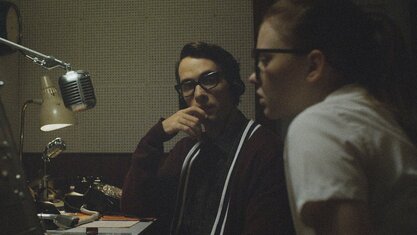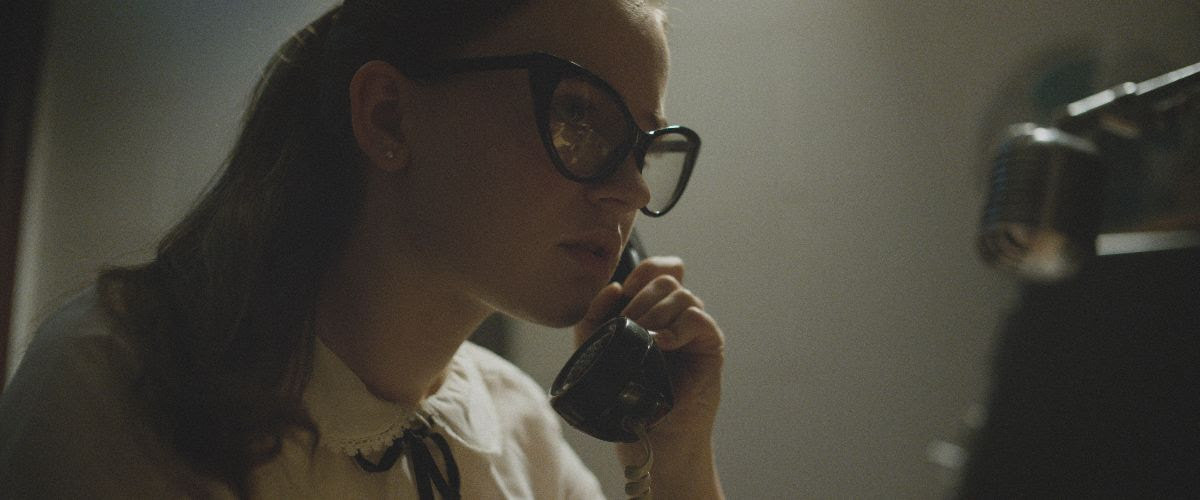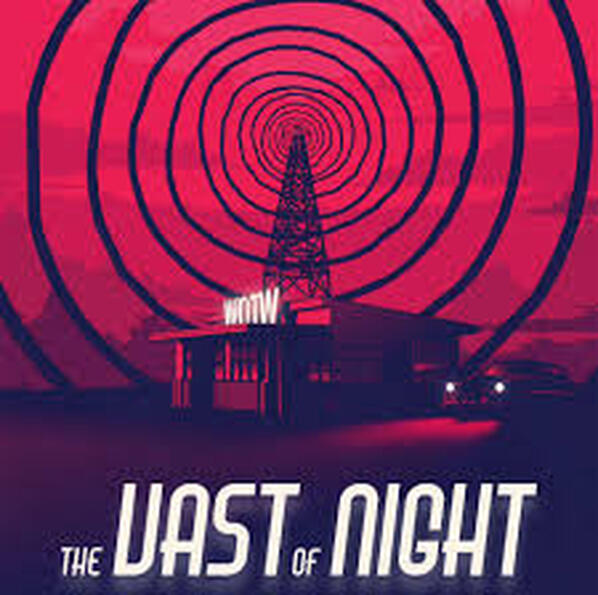 If there’s one film science-fiction fans will want to keep an eye on this year, it’s the uniquely elegant The Vast of Night, which played at the Overlook Film Festival this past weekend… …To be clear since you’re reading this on Killer Horror Critic, Andrew Patterson’s debut film is not in any way, shape, or form, a horror film. What it is however is a beautiful, mysterious, sometimes chilling depiction of the hopes and dreams of small town America, and what can sometimes happen when we dare to fly too close to the sun. Directed by Patterson and written by James Montague and Craig W. Sanger, The Vast of Night takes place in 1950s, New Mexico, and over the course of a single night, follows radio DJ Everett (Jake Horowitz) and young switchboard operator Fay (Sierra McCormick) as they attempt to track down the source of a strange frequency which could change not just their lives, but everyones. The Vast of Night begins with an odd though stylistic choice, opening on an old TV playing a show called “Paradox Theater”, a Twilight Zone-esque program with a narrator who sounds eerily like Rod Serling, introducing the latest episode entitled, you guessed it, “The Vast of Night”. We then propel into the television and into the world of Fay and Everett’s small town. The effect not only establishes that we are in for a story ripe with mystery and otherworldly strangeness, but creates a sort of meta-voyeurism in that we are acknowledging we are the viewer. As is much of the film though, this is a calculated choice by Patterson which seems to imply that we are in the seat of the mysterious aliens which potentially exist in the film, looking down on this little part of the world through their lens. McCormick and Horowitz are outstanding in their roles, partially thanks to the thoughtful writing of the filmmakers. Many of us can relate to this energetic pair, a couple kids spending their night getting high on a mystery while everyone else hangs out at the high-school basketball game. Both Fay and Everett want the same thing a lot of us do, which is to escape their boring small town and embark on the grander adventure that is life and the world outside what we know. But while Everett’s mind is more entrenched in facts and what he can see for himself, Fay is willing to believe anything that makes her small-town life seem more exciting. Horowitz and McCormick embue a vulnerable though powerful sense of giddy hope with their characters, making them kids we want to root for. Each has an admirable sense of adventure, ignoring whatever consequences may come. As Everett tends to repeat, “this is good radio”, and nothing else matters. That sense of excitement and need to be heard is a prevalent theme all throughout The Vast of Night. As Fay and Everett embark on a quest to discover the source of the strange signal coming into their station, they run into all sorts of characters, all of them searching for some kind of vindication of their beliefs, and recognition for any other label besides “crazy”. Whether it’s Billy (Bruce Davis), a man who acknowledges he is afraid no one will believe his story because it’s the 50s and he’s black, or Mabel (Gail Cronauer) an old woman accused of murdering the child she believes was taken from her, everyone in this cast of characters is looking for someone, anyone, to just believe they’re telling the truth. The Vast of Night becomes all the more poignant here because it is dealing with the very real issue of how the voices of minorities and the elderly were so often ignored, and unfortunately, still are, emphasized by Mabel’s line that, whatever is creating the signal, “free will is impossible with them up there” (perhaps a metaphor for government and those in power?) Patterson captures the time period with a fascination that will make you feel like a kid again. He and cinematographer M.I. Littin-Menz observe the town through impressive, Tim Burton-like sweeping long takes moving through town to the beat of the sometimes quirky, always provocative score from Erick Alexander and Jared Bulmer. There’s a lot of Close Encounters of the Third Kind in the childish wonder in which characters speculate over the potential alien frequency, adding a, dare I say it, Spielbergian quality of adventure and mystery. And no, I’m not saying Patterson is anywhere near the level of Spielberg, but the influence is clear. The Vast of Night feels and looks a lot like a Hollywood sci-fi film, which speaks to Patterson’s masterful direction. Much of The Vast of Night is shot with a slow calculation, building suspense not through something creeping around out in the woods, but through long takes which feel as if they span ten minutes, which forces us to be in a moment of suspenseful discovery with the characters. It’s not often that a film will have you holding your breath for minutes on end over a simple phone call, but it’s one of the many impressive effects which Patterson and his film achieve. Of course, this sort of filmmaking style also implies a slow-pacing, and The Vast of Night is no different. Outside of some eerie frequencies and flickering lights, there really isn’t a lot going on with the story on the surface level. Sure, the themes are intelligent and well-cooked, but in terms of storytelling, we as the audience perpetually feel stuck in the middle of the film, without much progression. Other than interviewing the occasional person, our characters aren’t involved in that much conflict, which leads to our protagonists stumbling into a brief though moving finale. The Vast of Night is the sort of slow, intelligent, personal story that is short on thrills, but big on ideas, and gorgeous as space itself, and it will have you contemplating its eerie last shot for days to come. By Matt Konopka
0 Comments
Leave a Reply. |
Archives
March 2023
|



 RSS Feed
RSS Feed